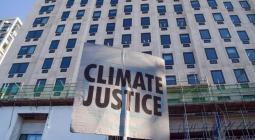Canada’s climate strategy needs allies. King Charles may be one
Canada is waking up to a hard truth: We are not ready for the climate economy already reshaping the world. Wildfires are now a season. Once-in-a-century floods strike every few years. Meanwhile, the U.S. and China are racing ahead with clean energy manufacturing, critical minerals strategies and massive green industrial plans. If we don’t act, Canada risks falling behind — not just environmentally, but economically and geopolitically.
That’s why Prime Minister Mark Carney’s June 2 announcement to fast-track clean energy and infrastructure projects couldn’t come at a better time. The plan signals a serious shift in our approach to building a green economy: Through carbon border adjustments, new industrial incentives and the creation of 10 national parks, we start to see the outline of a real climate industrial strategy.
But for this plan to succeed, it must go beyond regulatory reform and economic opportunity. It must be rooted in environmental justice, Indigenous partnership and international collaboration. In this effort, Carney may find a powerful ally: King Charles III.
Some Indigenous communities and provincial leaders have rightly raised concerns about the fast-tracking process. First Nations, Inuit and Métis communities are not just stakeholders — they are rights holders. Their legal authority and ecological knowledge are essential to shaping just and effective climate solutions.
With the United Nations Declaration on the Rights of Indigenous Peoples (UNDRIP) enshrined in Canadian law, meaningful partnership is not optional — it’s foundational. This means co-governance, Indigenous-led conservation and direct investment in community-driven clean energy projects, not after-the-fact consultation.
As Canada builds its climate strategy, King Charles III could be a valuable global ally. Long before it was popular, he championed environmental causes. Today, through the Sustainable Markets Initiative (SMI) and the Terra Carta charter, he’s directing billions toward biodiversity, regenerative agriculture and clean technologies. His message is clear: Finance must align with nature and long-term well-being.
At the helm of the SMI is CEO Jennifer Jordan-Saifi, who has mobilized over 250 CEOs globally to drive systemic sustainability reform. Her operational strength and convening power are helping turn a bold vision into action.
Carney, King Charles, and Jordan-Saifi have worked together before — notably at the Climate Finance Mobilisation Forum at Windsor Castle. Their shared values and credibility open the door to deeper collaboration. Canada could lead by proposing a Canada–U.K. Sustainable Finance Task Force, embedding Terra Carta principles into national partnerships, or co-developing funding for Indigenous climate innovation.
The urgency is heightened by our evolving relationship with the U.S. President Donald Trump has reintroduced sweeping tariffs on Canadian imports, disrupting supply chains and driving up costs for materials essential to our clean energy future.
Meanwhile, the Biden administration’s Inflation Reduction Act is reshaping the clean tech landscape, favouring American interests and intensifying competitive pressure on Canada.
Carney’s push to reduce our dependence on the U.S. through strategic investments in domestic infrastructure and supply chains is crucial. Same with strengthening our alliances — with Europe, the U.K. and Indigenous nations — to move beyond being a supplier of raw materials and toward becoming a leader in clean technologies, sustainable jobs and climate innovation.
Carney’s plan lays the foundation for a cleaner, fairer and more resilient future. But how we proceed — particularly in upholding Indigenous rights, strengthening international partnerships and overhauling bureaucracy — will determine whether we lead or lag.
We already have what we need: the global platform and moral clarity of King Charles, the lived knowledge of Indigenous communities and the economic insight of Carney. Together, they offer the leadership to drive a truly transformative climate agenda.
The question is no longer what must be done — it’s whether we have the courage to do it.
Cover photo: King Charles meets with Prime Minister Mark Carney at Rideau Hall during his two-day visit to Ottawa last week. Long before it was popular, the King championed environmental causes and has helped direct billions toward biodiversity, regenerative agriculture and clean technologies, notes Concordia University public scholar Sarah Farahdel.




